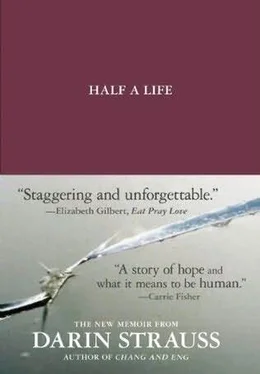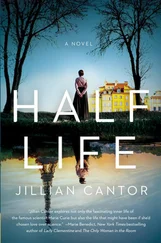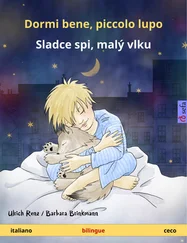My boys are named Beau and Shepherd and their arrival came like two hard kicks to the chest. Becoming a dad laid open a tender new flank of myself to life’s spikier possibilities. My swerve-and-lawsuit past was back — it was shading the way I saw things, like a bit of private weather, or a visor I couldn’t take off. What I really kept thinking about: the Zilkes, the nightmare of what they had to live with. Or had the nightmare lifted a bit for them? Couldn’t the nightmare please have lifted a bit for them?
One very early morning, alone with my sons, just months into their lives: sleep was a coating I’d been stripped of, leaving my wiring all exposed. Another 3 a.m. had found me holding two babies and two bottles, had me opening another shit-slathered diaper. The typical new-dad distress; the predictable, slapstick wretchedness. But one of my sons now turned to me — and I could tell he was doing so, as it were, for the first time: his look bespoke a little recognition. So I’d been wrong when I’d presumed to lop off the very beginning of a life. We record things right away; what touches us matters. I grasped — with new, gut intensity — that my sons were mine . This deep-hitting awareness raked up my different selves. (But couldn’t the Zilkes maybe have found a strengthened, cautious love; couldn’t I just try, in thinking about who they’d become, to ignore the thorns and likelihoods?) Easing the bottle from Beau’s mouth, I could see him — for a half-second, until I stopped myself — as Celine. I had a thought, or at least an upsetting wordless brain throb, about what it might be to make and hold a life and then release it.
“How’s the thing going?” Susannah said, against all better judgment.
Whenever I tried even to think how to manage it, the wires would cross and spark.
I was afraid.
“Are you sure you even want to write non-fiction? Or would be able to?” Susannah said one morning, a provocation. One of Susannah’s attributes is that sometimes she doesn’t know when she’s arguing.
Who knows, I thought, perhaps she’d been faking her certainty of my innocence.
So why didn’t I just give it up? I had another good reason to. How do you grieve for someone before you start the work of understanding her? It’s like trying to worship at the blueprint for an unfinished temple.
Even after all this time, nothing had forced me to examine the accident, or Celine herself; everyone had let me slip through, and I realized the only person who really had the authority to force that examination, for better or worse, was me.
I shouldn’t even say I realized this yet; I was only starting to get it. But I knew enough to not give up, when I had given up so often in the past. We contain more than our understanding allows us, at a given moment, to understand.
A September 2009 item in The New York Times said that every U.S. death affects, on average, four other people profoundly. Of these affected survivors, something like 15 percent can “barely function.” And this decisive suffering — which lasts and lasts, and offers “no redemptive value”—has been given a name, to distinguish it from what used to be called sorrow: Complicated Grief Disorder .
Complicated Grief Disorder sounds a lot more potent than what I suffered — though perhaps not so different from what Celine’s parents suffered. (It’s chronic and intense. It’s people deciding that, because their beloveds can no longer walk the streets, they also are unfit to walk the streets. One mother told the Times: “Eric couldn’t have any more birthdays; why should I?”)
The treatment for this affliction is an unprecedentedly rigorous form of the talking cure. And also, maybe, a breakthrough: therapists force patients to relive the details of the death, making them repeat the minutiae of their pain into a tape recorder in front of an analyst. The patient then replays this tape — this doting agony chronicle — at home every day. For months or even years. This would seem, at first glance, like a religious observance or a torture. But according to the Times , the therapy is totemic. It’s not about making the tape, or listening to the tape. It’s about possession, about having the story in one place. “The goal is to show that grief, like the tape, can be picked up or put away,” the article said. In “Treatment of Complicated Grief: A Randomized Controlled Trial,” The Journal of the American Medical Association declared this tape-and-torment approach “twice as effective” as the conventional therapy used to treat chronic grieving. (Another plus: it also worked much faster.)
In a separate Times article, George A. Bonanno, a professor of clinical psychology at Columbia, called the available mourning data “embarrassingly bad” and said “[conventional] therapy for bereavement in general is not very effective.”
No one says this new treatment is a complete salve for heartache, nor even that it should be. The Times again: “Diagnosing a deeper form of grief, however, is not about taking away anyone’s sorrow.” “We don’t get rid of suffering in our treatment,” said one of the doctors. “We just help people come to terms with it more quickly.”
Isn’t that what we’d all hope — even the dead? That those who have died can lose their hold on the living? That the dead will lose their spell over these poor people.
I hoped to make this book my tape.
“Are you nervous?” Susannah asked, dropping her eyes before looking back at me: a quick shyness that was uncharacteristic.
My 10-and-2 grip on the steering wheel tightened.
“Yeah, a little, I think.” My voice sounded surprisingly meek, too.
I fixed my gaze on the windshield. It was ice-crusted; this was in February. I’d been trying to anticipate and then solemnize each brief hill as we climbed it, and all the grassy clearings we passed. This was a strip of road I hadn’t seen for more than half a life. I was preparing for the moment when the background — a sheet of stones, trees, lawn, and shoulder — would become the hard foreground, would become the thing that had remade me.
Here I was on West Shore Road, near Bar Beach, where my past had located itself. I was back and, I hoped, changed. A traveler from the world of grown-ups.
Our sons were six months old and fuzzy-headed, and they sat babbling to each other in the back of our Honda. It irrationally frustrated and wounded me that the boys had no idea where we were driving, and I wanted to say — because I know this is true, too — that we were going to the place that had allowed them to be born. I would’ve been a different person had the accident not happened. Without Celine, I wouldn’t have become a writer, I don’t think. And therefore I wouldn’t have met their mother. I find it an amazing stroke of luck to be married to Susannah. To be a parent with Susannah. That’s the meter you come up with, as you approach forty. If your relationship fills you with a sense of luck, you’ve chosen well. I wanted the boys to know all this, but they couldn’t understand it. I don’t think even Susannah could understand it as much as I did. The boys kept up their babbling.
Forty minutes earlier, we’d trussed them into their infant seats. The city had thinned and scattered into the placid array of North Shore Long Island. I was driving across that crocodile’s back again. Buildings, as if getting the okay sign that the coast was clear, became wider, turned into homes and lawns. Now the talking stopped, and the radio, too. Uphill, downhill, then the road grew bare of towns altogether. It was just a place between places, a place you had to get through, nowhere anyone wanted to be.
“Is this how you pictured it?” I turned my flustered face to Susannah. “Is it?”
Читать дальше









